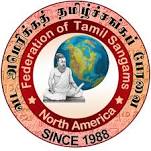 | |
| Abbreviation | FeTNA |
|---|---|
| Formation | 1987 |
| Type | Non-profit organization |
Region served | North America |
Official language | Tamil |
| Website | fetna |
The Federation of Tamil Sangams in North America (FeTNA) is a non-profit organization of Tamil organizations in the United States and Canada. It is a registered, [1] non-profit, tax-exempt 501(c)(3) organization and founded in 1987 by five Tamil organizations: Tamil Association of Delaware Valley, Tamil Sangam of Washington & Baltimore, New York Tamil Sangam, Ilankai Tamil Sangam and Harrisburg Tamil Sangam. As of 2025, FeTNA represents 71 [2] Tamil organizations based in America and Canada. [3]
Contents
- Activities
- Convention
- Support for Tamil studies
- Fundraising for disaster relief work
- Organization
- Ethnic conflict in Sri Lanka
- Public stances
- US civil rights lawsuits
- Criticism
- Other political stances
- California Hindu textbook controversy
- Support for caste-based reservations in India
- References
- External links